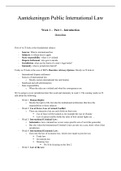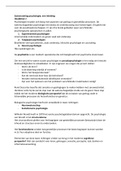Aantekeningen Public International Law
Week 1 – Part 1 - Introduction
Hoorcollege
First of we’ll look at the foundational subject:
- Sources: What is international law
- Subjects: to whom does it apply
- State responsibility: when is it violated
- Dispute Settlement: who gets to decide
- Jurisdiction: what are the limits of a state’s legal order?
- Immunity: what is jurisdiction barred?
Today we’ll look at the case of ICJ’s Mauritius Advisory Opinion. Mostly we’ll look at:
- International dispute settlement
- Sources of international law
o Mostly custom international law and treaties
- Statehood and self-determination
- State responsibility
o When the rules are violated and what the consequences are
We’re going to cover jurisdiction later this week and immunity in week 3. The coming weeks we’ll
talk about the following:
- Week 1: Human Rights:
o Mostly the right to life, but also the institutional architecture that have the
responsibility to these subjects
- Week 2: Use of Force; Law of Armed Conflict:
o These are interactive but are each fields on their own.
Use of force will be looked at, for example the war in Ukraine
Law of armed conflict holds the rules of how armed fights are …
- Week 3: International Criminal Law:
o Substantive: how criminal law covers some specific acts of war (like genocide)
o But also when the International Criminal Court can rule on a case, short: when it has
jurisdiction
- Week 4: International Economic Law:
o Goes into the law of economic law, which were made to prevent war.
Trade law
Investment law
Monetary law
We’ll be focusing on the first 2
- Week 5: Law of the sea:
, o This part of the law is probably the oldest and we’ll be going into maritime law.
Rules on where countries jurisdiction lies and where it ends, but also where their
responsibility lies.
- Week 6: International Environmental Law:
o We’ll mostly be going into procedural aspect: environmental impact statements and
what that requires from states.
Ofcourse we’ll not be covering every type of law, and what we’ll be covering won’t be the entire
range of the subject. Please don’t fall behind, that will make the course much harder.
Than we’ll be going into the case of the Chagos Archipelago:
- Background; Time: it started in the 1960s in the cold war. In the time when a lot of
decolonization started.
- Background; Reason:
o The fear was that America would lose it’s power of the region of the Chagos Island. It
was fearful of having to lose power to the Russian Federation. The Chagos Island lay
very far from the island of Mauritius.
o In 1965 the island of Mauritius and the Chagos Islands came to the 1965 lancaster
House Agreement which would separate the Chagos Islands from Mauritius. It was a
representative power but without real power. This is because Mauritius was still
under the colonial power of the United Kingdom Government. The Agreement holds
the states that the UK could keep Chagos while separating from Mauritius for the
time that they would need the strategic position of Chagos Islands.
o In 1965 the British Indian Ocean Territory was established
o 1968-1973 holds the forcible removal of the chagos Islands taken from Mauritius.
o However at this point, the cold war is over. But post 2001 America still uses the
Chagos Islands for Extraordinary renditions.
Now we know the background, we can look closer at International Dispute Settlement (IDS). For
that we need to look at a couple of points. First of we’ll go back to the fundamentals of IDS:
- The types of adjudicatory bodies:
o Standing (permanent): the bodies of the ICJ are permanent, the people inside them
stand for 9 years. The international court of justice can deal with the entire field of
international law. It also has a very long line of jurisprudence.
o Ad hoc (temporary): these old the arbitrary tribunals. They stand for the time of the
settlement and then they’ll dissolve
- Contentious jurisdiction: methods of consent: There are two types of jurisdiction:
o Legal disputes and legal disputes that are between states alone.
Special agreement (ICJ Stature Art. 36(1)): it’s backword looking, the
conflict has already happened or is happening but the states will agree on a
way of handling the conflict.
For example: the north sea continental shelf case
Compromissory Clause (ICJ Statute art. 36(1)): these are forward looking,
they hold the rules of when to send a case to the ICJ. They hold the moment
of when to make a referral to the ICJ.
Optional Clause decl. (ICJ Stature Art. 36(2)): states file declarations with
the court, these declaration recognize the courts jurisdiction over all the
disputes that might arise in the future, this can be limited to certain field. For
example the Netherlands won’t let the ICJ rule on historical cases. An other
example is England, who also has an optional clause but has an exemption
for all it’s former colonized states.
, Forum Prorogatum (ICJ Rules Art. 38(5)): this is a last resort, it doesn’t
usually work.
- Advisory jurisdiction (UN Charter Art. 96):
o The court can give advisories. Some bodies can be requested an advisory opinion.
For example: The World Health Organization and the World Bank.
o They won’t deal with cases but they’ll give advise. These are non-binding but they
are quite autorotating and they of course hold some form of informal power.
o In the last 20 years the ICJ gave some very important opinions. For example the
advisory opinion on the Israelian settlement on Palestinian land as well as the
Opinion on the Kosovo war.
o There are certain circumstances when the court has jurisdiction but won’t do it
because it seems inappropriate to give the advice. Art. 96 says that the court ‘may
give advice’, but it doesn’t have to. The court could decline to give advisory opinions
when it’s not appropriate.
Now we’ll go into the ICJ’s Advisory Jurisdiction in Mauritius AO. First of we’ll talk
about the:
- Jurisdiction (paras 55-62): the UK refused to hold the jurisdiction of the ICJ, the argument
was that by giving the advisory jurisdiction, the court would go into the of the UK’s
permission to give advise on colonial history. The UK says that it would circumvent the
principle of consent. But the court said it didn’t because it isn’t a settlement, but a advisory
opinion. The requested opinion concerns decolonization, not about an individual case of UK’s
decolonization but the entire process. In this case the questions which where submitted to
the court, were very narrowly written to not go into sovereignty
Sources of international Law. Sources are relevant and important. IN order to determine whether the
decolonization was legal, we have to look at a couple of questions:
- Time: first of we’ll need to look at the time when the process happens. This is because these
rules are not up to treaties, but they are of customary law (=gewoonterecht).
- Source: customary law has been laid down in ICJ Statute Article 38(1(b)). IN the same
article are stated all the sources of international law. The Article would today be drafted
differently, for example it wouldn’t state ‘civilized’ countries and also it would site more
sources. But let’s dive deeper into the article:
o ICJ Statute article 38:
a. Treaties: this makes up the most of international law.
b. Customary international law: some parts of the law are not laid down in treaties,
these rise from customary international law. Think about state immunity.
Customary International law can come from a couple forms of practice:
a. State practice: the custom has to be widespread, used by multiple
countries and most of the time needs to have been accepted for some time
b. Opinio Juris: the acceptance as a practice as law, as legally obliged. The
subjective or psychological make of international law. It’s a way of
distinguishing state law, because a state looks at the rule as the rule of
law. Because a state thinks of it as law. It’s difficult to detect opinion
juris. This is because it, most of the times, isn’t stated by a head of state
or a secretary of state.
i. It’s best to think of opinion juris as the inferences that can be
drawn as a states legal rules, for example their legal obligation to
do something.
c. General principles of international law
d. Judgments and …
, Now we’ve looked at the sources of ICJ law, we can go into the Mauritius AO case (para 144-
162). Because there is no treaty on the right to self determination at the time of the chagos
Archipeligo. So we’ll have to look at the customary international law and see if it has cristalized
enough to be seen as customary international law. Some states say that they don’t crystalize until the
Friendly Relations Declaration 1970, after the case of Mauritius AO. The court however did not
agree:
- In the Friendly Relations Declaration 1970: the court gave a short look into. The Court rules
that during the 1960s the decolonization process was taking on steam. The general assembly
resolutions during this time are very important to know whether it’s customary law.
- The court mostly looks at the GA Res 1514 (XV) (1960) which is ten years earlier than the
Friendly Relations Declaration. The court rules that this resolution forms the basis for state
practice as well as opinion juris. The 1960s resolution was declaratory to the right of self
determination. It determined what was already crystalized. 89 states voted for the resolution
and confirmed the normative status of self determination.
o Basic conclusion: in 1960 the rules of self determination already crystalized.
Now we’ll go into statehood. As we indicated, in this case the court didn’t shy away on the
topic of self determination. It’s important to answer the question of when a entity can be described as
a state. The criteria for statehood are laid down in the Montevideo convention. These are the
touchstone for a state:
1. Permanent population:
a. The population needs to be there for the entire year, it can’t be a group of
fisherman that live there for a certain time of the year
2. Defined territory
a. Parts of the border can be contested, but that doesn’t dispute the statehood, as
long as the general area is clear.
3. Government
a. The government doesn’t have to be the only one but it must be the generally
recognized one.
4. Capacity to enter into relations with other states
a. In other words: independence. They must be able to make a treaty or a statement
to the ICJ. Most of the time when the other three criteria are completed, this one
automatically is acquired, however not always.
An other important criteria for statehood is recognition:
- It’s a means by which other states recognize a certain entity. This isn’t required but it’s an
important indicator.
So let’s look at self-determination. What’s uncontroversial is the self-determination in
decolination context (GA res 1514):
- Para 1: all the people have the right to self-determination. Self determination points to:
political status; economic, social and cultural development .
- Para 5: immediate steps to transfer powers: As of the 1960s colonial powers have the
obligation to support the process of decolonization without requirement. So countries can’t
say: okay, you can be a independent state if you give me this area.
- Para 6: territorial integrity
In the case of self-determination in Mauritius AO (paras 170-174) the court ruled that there is no real
agreement. The detachment of Chagos was not based on the free and own admission of the Mauritius
representative. This is because it happened under ‘heightened scrutiny’. There was no freely given
consent. By consent we mean that the people of Mauritius did not consent to the detachment of the







